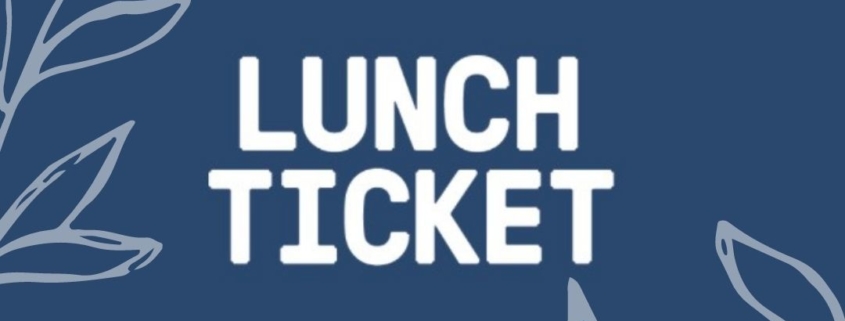What Would Dolly Parton Do?
Hello fellow Word Processor Mavericks!
When I first was asked to write about voice I thought I had drawn the short end of the stick. What, exactly, are we talking about when we talk about voice?

Photo: http://blackgoldhockey.com/wp-content/uploads/2013/08/Confused-Baby.jpg
What does it mean to have an “original voice?” And how do I get one of those?
Let me lay some knowledge on you:
In her essay, What is Voice in Creative Writing, Paulette Bates Alden quotes Eudora Welty:
In One Writer’s Beginnings, Eudora Welty talks about how from an early age, she always heard the sentences on the page in a voice “…saying it silently to me. It isn’t my mother’s voice or the voice of any person I can identify, certainly not my own. It is human, but inward, and it is inwardly I listen to it. It is to me the voice of the story or the poem itself… I have supposed, but never found out, that this is the case with all readers – to read as listeners – and with all writers, to write as listeners… My own words, when I am at work on a story, I hear too as they go, in the same voice that I hear when I read in books. When I write and the sound of it comes back to my ears, then I act to make my changes. I have always trusted this voice.”
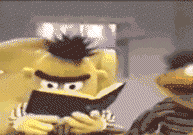
Photo: http://images2.fanpop.com/image/photos/13800000/Bert-reading-Twilight-harry-potter-vs-twilight-13896899-193-135.gif
What does she mean?
That quote is jam packed with little bits of goodness:
“It is human, but inward, and it’s inwardly that I listen to it.”
“To read as listeners.”
“Write as listeners”
“I have always trusted this voice.”
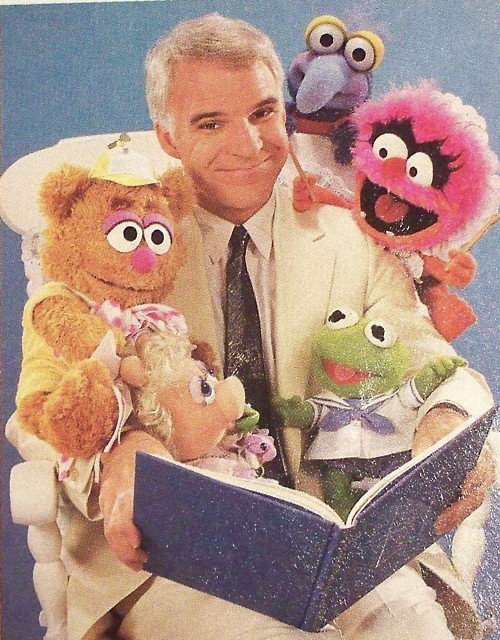
Photo: http://www.autostraddle.com/wp-content/uploads/2013/07/the-muppets.jpg
But, I still didn’t get it.
What does this little voice have to do with a distinct voice?
And then this happened:
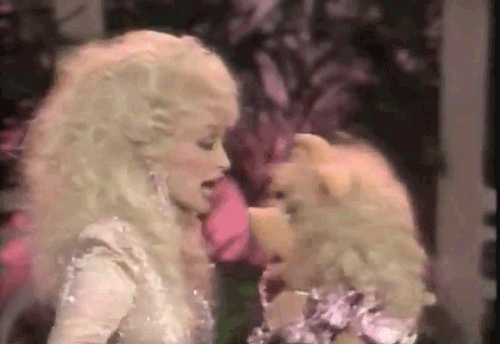
Photo: http://24.media.tumblr.com/tumblr_lzuykuHSYI1r1c3jbo1_500.gif
The hair! The makeup! And we are not even talking about Dolly Parton, (though Dolly’s hair in this gif is especially epic). It all dazzled me for a moment and then I remembered something that Dolly had said:
“Figure out who you are; and then do it on purpose.”
Dolly is right. If you know who you are then it makes it a lot easier to have a voice. I think that Dolly is more succinct than Eudora, but they are saying the same thing; if you are true to yourself, then it makes listening to that little voice a lot easier because there is not a lot in the way. This is why Dolly is able to be so amazing: she knows who she is, and she sticks to it. She wrote “9 to 5” on her Lee Press On nails and was nominated for an Oscar for it.
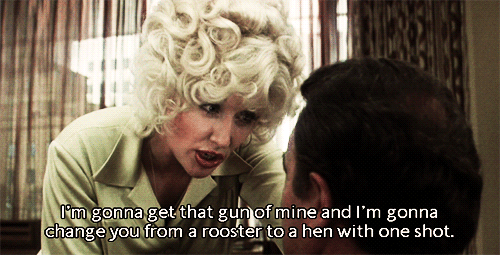
Photo: http://24.media.tumblr.com/tumblr_lsrtjxOJcj1qftpcmo1_500.gif
She wrote “I Will Always Love You”
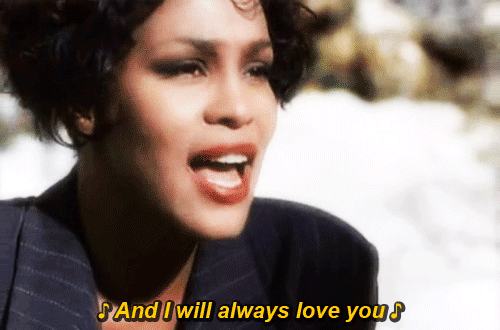
Photo: http://media.tumblr.com/fb4f97967f55126af5140da698787388/tumblr_inline_mmn4mu7opu1qz4rgp.gif
Here was a woman with a voice. (All the puns intended.) She is a country girl and she does not stray far from this idea. She listens to the little voice in her head and she doesn’t let anyone get in the way of that. She could have been another lady country singer with big “assets,” but she is more than that because she doesn’t let anything get in the way. Dolly hasn’t changed down through the ages.
From the 1970s
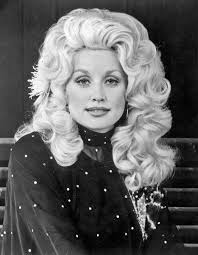
To today:
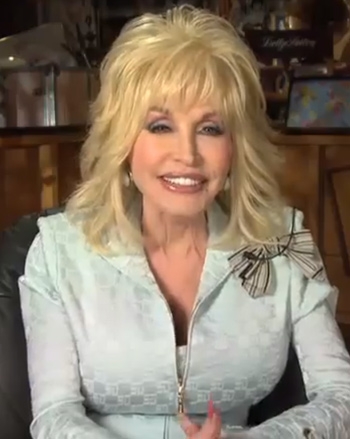
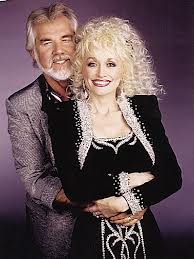
On a not-so-funny aside when I lived in Asia I had to sing “Islands in the Stream” with my boss at a kereokebong. This was the most awkward moment of my life.
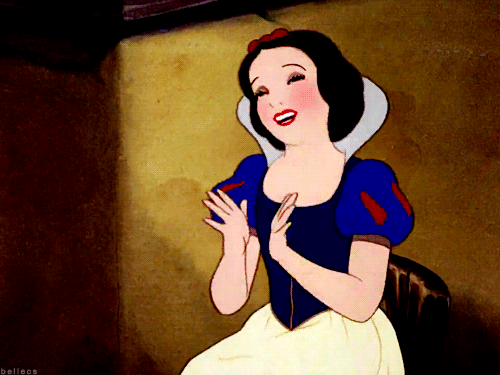
Photo: http://media.tumblr.com/tumblr_lre1x0Zezz1qfd46o.gif
The real trick to voice will lie in how each of us goes about retelling this tale. We should all do as Dolly Parton does and chose a way of telling that keeps the retelling true to who you are as a writer. We are looking to become aware of our “authorial voice”. If you’re a poet, what does Snow White look like as a poem? For all the CNFers, what would Snow White look like as a personal essay? Do you feel like you always write about the country, or do you write about the city? Are you more interested in zombies and aliens?
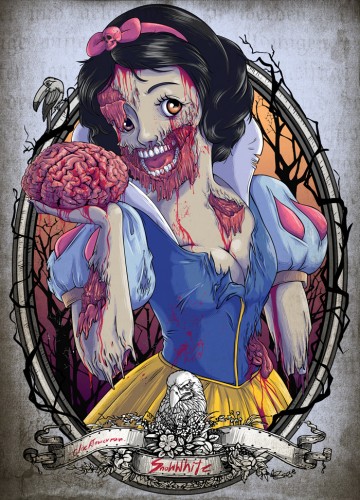
Photo: http://fc08.deviantart.net/fs70/f/2012/174/2/7/the_zombie_snow_white_princess_by_clocktowerman-d54le07.jpg
These things that preoccupy us, the zombies, the country, sex, and the city; these are the things Dolly was talking about when she said “figure out who you are; and then do it on purpose.” When we know our preoccupations, we know why we write about them and we become more of an authority on the subject. This authority colors our writing and, I think, makes it better.
For brevity’s sake, if you’re doing something wild and crazy like a poem or a personal essay, you could just do the first paragraph or a first draft of the poem. What we’re after is not quality but an awareness of how and why we choose the words we do, the way we tell our story, and the parts of the story that we deem important.
If you would like to see what a different interpretation of Snow White looks like, here is Donald Barthelme’s twist on the old classic: Snow White
Please leave your responses as replies to this message. I think it would be interesting if we can all see each other’s responses.
Please leave your responses as replies to this message. I think it would be interesting if we can all see each other’s responses.
Caitlin was born and raised in Portland, Oregon. She still lives there, and this makes her a rare unicorn in a sea of transplanted twenty-somethings who came to be artists and drink cheap beer. Also, she is now in her 30s and has moved on to Bourbon. She is a current MFA candidate in fiction at Antioch University LA. She has been published here and there with the last one being in Chiasmus Press’ Stories from the Edge: A Northwest Anthology.

